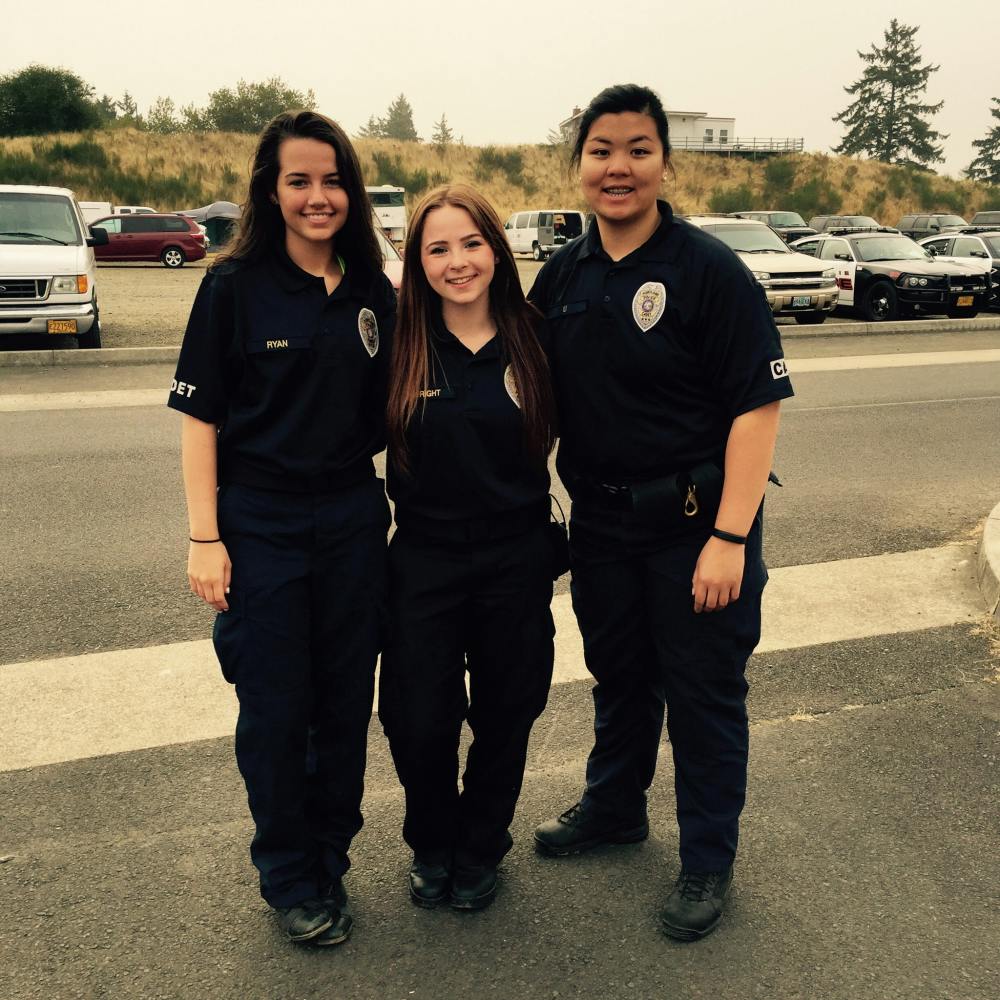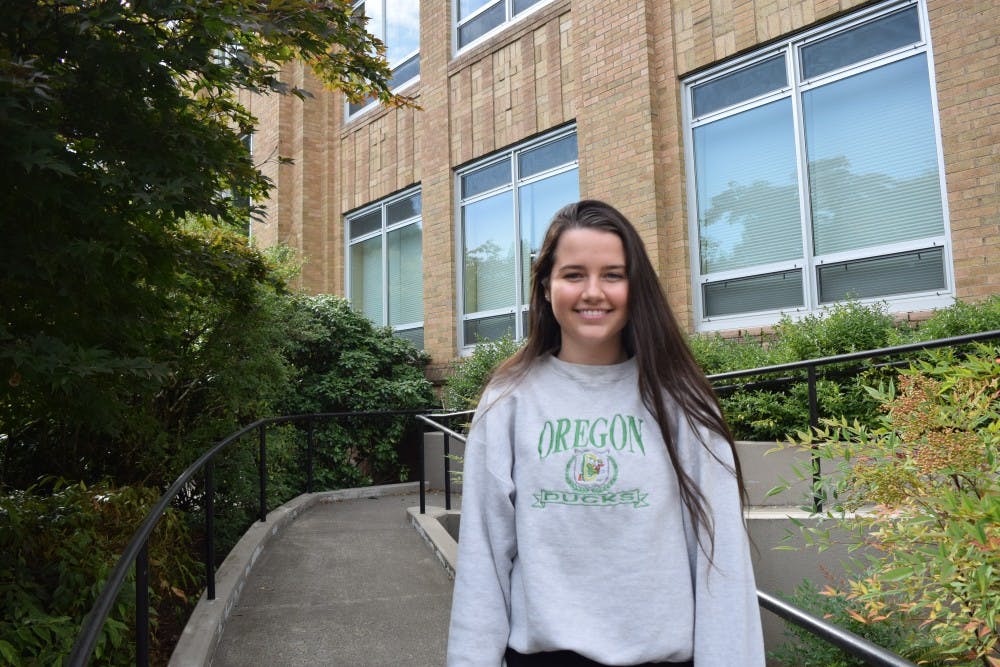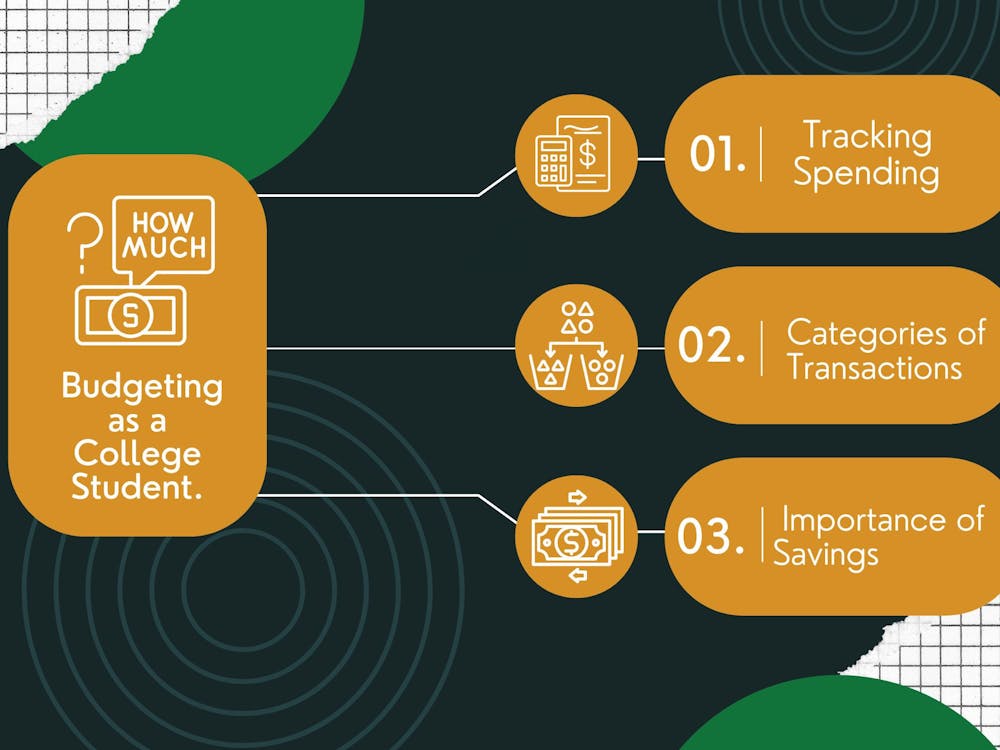Maggie Ryan spent one of her weekends this summer at the concerts in the park in East Portland, but she wasn’t there to see the performers. Instead, Ryan showed off the lights, sirens and interior of a Portland Police patrol car to kids and families at the event. This is common for cadets volunteering with the Portland Police Cadet Program, who work shifts in uniform at community events, like parades or concerts.
“Interactions that we get to do with young people can change their whole view on how they view police, which is really cool,” Ryan said.
Ryan, a junior computer science major, balances her schoolwork with her volunteer position as a Portland Police Cadet. Portland Police Cadets spend time with officers during ride-alongs or special assignments and also work city and community events. Ryan hopes to use her experiences as a cadet and her computer science degree for a future degree in the FBI as an investigator.
“People sort of view you as police, but you’re not,” Ryan said. “It’s really fun.”
After her acceptance into the Police Cadet Program during her senior year of high school, she went through a four-month-long training of learning traffic laws, hands-on self-defense and how to properly shoot a gun, though cadets don’t carry a weapon with them while on duty.
“Even if you don’t want to be an officer, it’s still a really great learning experience to learn about that profession, what they go through, and what the job is like,” Ryan explained.
Following graduation from their training, cadets are required to attend weekly meetings every Sunday for three hours at one of three police stations, or “precinct posts.” Ryan said, at meetings, she and the other cadets learn about how to handle possible scenarios like active shooters or domestic violence threats.
“Because there are cadets all over the state, every summer we have a competition where we train different scenarios,” Ryan explained. “It’s pretty much what we do on Sundays.”
Though Ryan has a busy computer science major schedule, she said she still makes time every other week to do 10-hour night shifts on Fridays or Saturdays. While on duty, she said she can drive a police patrol car or volunteer at events around the city. But Ryan said her favorite part are the ride-alongs, which is riding in an officer’s patrol car during their shift.

Ryan with fellow police cadets in their uniforms. Photo courtesy of Maggie Ryan.
Working with the Police Cadet Program allows cadets to experience another aspect of Portland than what they typically know. Ryan said she grew up in the West Hills of Portland, but with the Cadet Program, she interacts with people from all around the Portland community.
“It’s a completely different demographic than I’m used to and I love just meeting those people,” Ryan said.
One type of assignment Ryan does is an “alcohol mission.” Since Ryan is under 21, she will go undercover (without a uniform) with a sergeant and some other officers to gas stations around Portland to see if the employees will sell her alcohol.
“I’m more into investigative work,” Ryan explained. “I want to do more investigation type of work, maybe stuff with computer science.”
With Ryan’s degree in computer science, she said she hopes to work for the FBI investigating crimes with the help of computers. Ryan said she has met with a recruiter for the FBI about a possible internship or graduate program, but hasn’t decided yet on which option she will pursue.
“They’re looking for people who have expertise in other areas, and who can use those expertise in law enforcement,” Ryan said, explaining her choice to pursue a computer science degree versus a criminology degree.
And though she maintains a busy schedule, Ryan still manages to dedicate her time to her studies and the program, as well as her friends and family.
“She is spunky, charismatic and hard-working,” Rachael Aber said, a close friend of Ryan’s. “I see her working a lot…I see her putting the hours in.”
In her last three years as a Police Cadet, the Program has provided clarity for Ryan for her future goals of working for the FBI and with law enforcement.
“You can’t have hidden agendas and you really just have to be down-to-earth person,” Aber said. “I think that’s helped her be a really good cadet.”
Even though her friends have only ever known her as a cadet, they can see the ways that Ryan’s character allows for her to do her job well.
“It makes her driven,” Megan Butler said, a close friend of Ryan’s. “She can really see what she wants to do.”








